Linguistics > QUESTIONS & ANSWERS > AP Euro Exam Review Questions and Answers 100% Correct (All)
AP Euro Exam Review Questions and Answers 100% Correct
Document Content and Description Below
AP Euro Exam Review Questions and Answers 100% Correct Scientific Revolution ✔✔advances in the knowledge of how nature works, included new discoveries and solved ancient problems, moved knowled... ge from uncertainty to uncertainty, came in the fields of physics, astronomy, and medicine alchemy ✔✔the belief that matter could be understood and transformed by mixing substances and using secret formulas, a famous alchemist was Paracelsus, who said that metals as well as plants might have medicinal properties Vesalius ✔✔influenced anatomy and astronomy, wrote The Structure of the Human Body, member of the Padua faculty, pointed out errors in the work of Galen, he used dessections to produce anatomical descriptions that opened a new era of careful observation and experimentation in the study of bodies, influenced anatomy to move to a new level Copernicus ✔✔wrote On the Revolutions of the Heavenly Spheres, said that the calculations of planetary movements of Ptolemy were way too complex but Copernicus's were also complex, he believed in the heliocentric theory, which said the sun is the center of the universe, Polish, successors found his calculations to be indespensable, ideas became a part of inellectual discussion, influenced the creation of the Gregorian calendar, the scholarly community argued over the certainty of Copernicus's ideas Tycho Brahe ✔✔the leading astronomer of the era, produced the most remarkable observations of the heavens before the invention of the telescope by plotting the path of the moon and planets every night for decades, came up with an uneasy theory that was a compromise between the Ptolemaic and Copernican systemsKepler ✔✔German, made major advances in the work of Copernicus and helped resolve the uncertainties in astronomy, believed that only the language of math could describe the movements of the heavens, famous astrologer, thought Copernicus was right, wanted to confirm the heliocentric theory right, discovered the three laws of planetary motion, opened a new era in astronomy, proved that orbits of the planets are ellipses and that there is a regularity based on their distance from the sun which determines the movements of all planets Galileo ✔✔Italian, first to perceive the connection between planetary motion and motion on the earth, came up with the theory of inertia, was 1st to infer that Jupiter has satellites and moons, taught the heliocentric theory, which caused trouble with the church, they told him to quit teaching this and in fear of excommunication, he renounced beliefs, invented the telescope, was one of the first to approach his work in the same way as modern scientists, wrote Dialogue on the Two Great World Systems, advocated experience, reason, and doubt, did not let common sense and theological teachings get in the way Pope Gregory XIII ✔✔decided to reform the calendar in 1582, creating the Greorian calendar William Harvey ✔✔English doctor, revolutionized the understanding of the human body when he ientified the function of the heart and proved that the blood circulates Newton ✔✔contributed to math, physics, and astronomy, he combined these three to explain motion, developed calculus and the basic laws of modern physics, which govern the motion of the moon and the planets, wrote Principia, which said that math and experiments prove science and give it certainty, active participation in meetings of the Royal Society of London, provided the expanation of the movement of objects in space, said that the world was stable and orderly, first scientist to receive a knighthood in England epistemology ✔✔a new theory of how to obtain and verify knowledgeBacon ✔✔inspired scientists with what they could contribute to society, said that science is the savior of humans, greatest of science's propagandists, wrote the New Atlantis, which held his view of an ideal society, believed in induction induction ✔✔starting with observation, the logical process by which one moves to general principles, advocated by Bacon Descartes ✔✔French, made first attempt to apply the new methods of science to theories of knowledge, said that people can be deceived by their senses, so one should apply all knowledge to the princple of doubt, refusal to accept an authority without verification, came up with "I think therefore I am." showed the difference between faith and reality and the difference between science and fate and perception, theoretical instead of experimental, found difference between mass and weight, used deduction, wrote the Discourses deduction ✔✔knowing a fact with certainty, therefore you can deduce another fact, gaining facts from facts, advocated by Descartes Pascal ✔✔said that faith was more important than science, truths found in science are limited, wrote the Pensees, anxious about the growing influence of science Royal Society ✔✔formed by Robert Boyle and eleven others in 1660, acted as a more permanent and systematic organization of scientific activity, granted a charter by Charles II, served as a headquarters and clearing center for research, began publishing Philosophical Transactions Mannerism ✔✔attempt to escape reality, echoed by painters called Mannerists, El Greco was a huge mannerist, who cultivated artificial and esoteric images of the world El Greco ✔✔Greek, compelling, mystic,created an otherworldly alternative to the troubles of his time, cool colors, eerie lighting, elongated and agonized humans, used perspective, a skepticMontaigne ✔✔French, obsessed with death, directly adressed issues he struggled with and created the essay thru this, inspired the search for self knowledge, at first he was skeptical about finding self knowledge but realized that he could Neostoicism ✔✔inspired by the ancients Stoics' emphasis on self-knowledge and a calm acceptance of the world, Justus Lipsius argued that public leaders should be guided by profound self-examination, restrainment and self-discipline Cervantes ✔✔wrote Don Quixote, which is about windmills that he thinks are giants so he fights them, shows social satire, captures the disillusionment that accompanied the political and economic decline of Europe's most powerful state, ridiculing the excessive chivalry of Spanish nobility Shakespeare ✔✔used both good and bad imagery, he made timeless statements about human behavior, used love, hatred, violence, sin, stability, instability, patriotism, showed all sides of man, uses humans to glaze over problems, wrote tragedies and how humans feal with change, conveyed the tensions of the time Baroque ✔✔grew as a result of sense and assurance of settlement after 1600, different from mannerism because people wanted to forget it and it was uneasy, had more grandeur, passion, drama, and mystery, closely associated with the Counter-Reformation's emphasis on gorgeous display in Catholic ritual, grandeur, theatricality, ornateness [Show More]
Last updated: 2 years ago
Preview 1 out of 35 pages

Buy this document to get the full access instantly
Instant Download Access after purchase
Buy NowInstant download
We Accept:

Reviews( 0 )
$7.00
Can't find what you want? Try our AI powered Search
Document information
Connected school, study & course
About the document
Uploaded On
Nov 14, 2022
Number of pages
35
Written in
Additional information
This document has been written for:
Uploaded
Nov 14, 2022
Downloads
0
Views
170
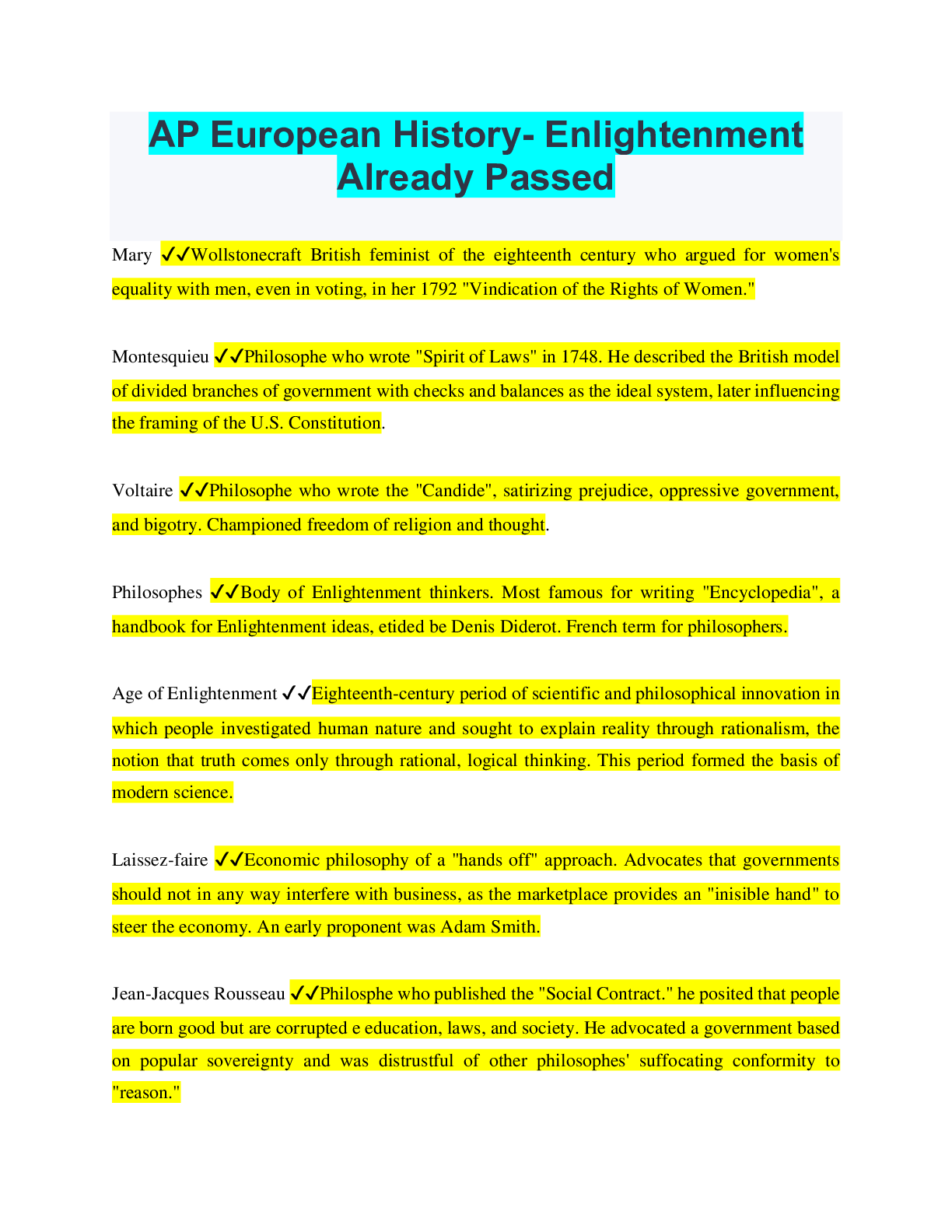

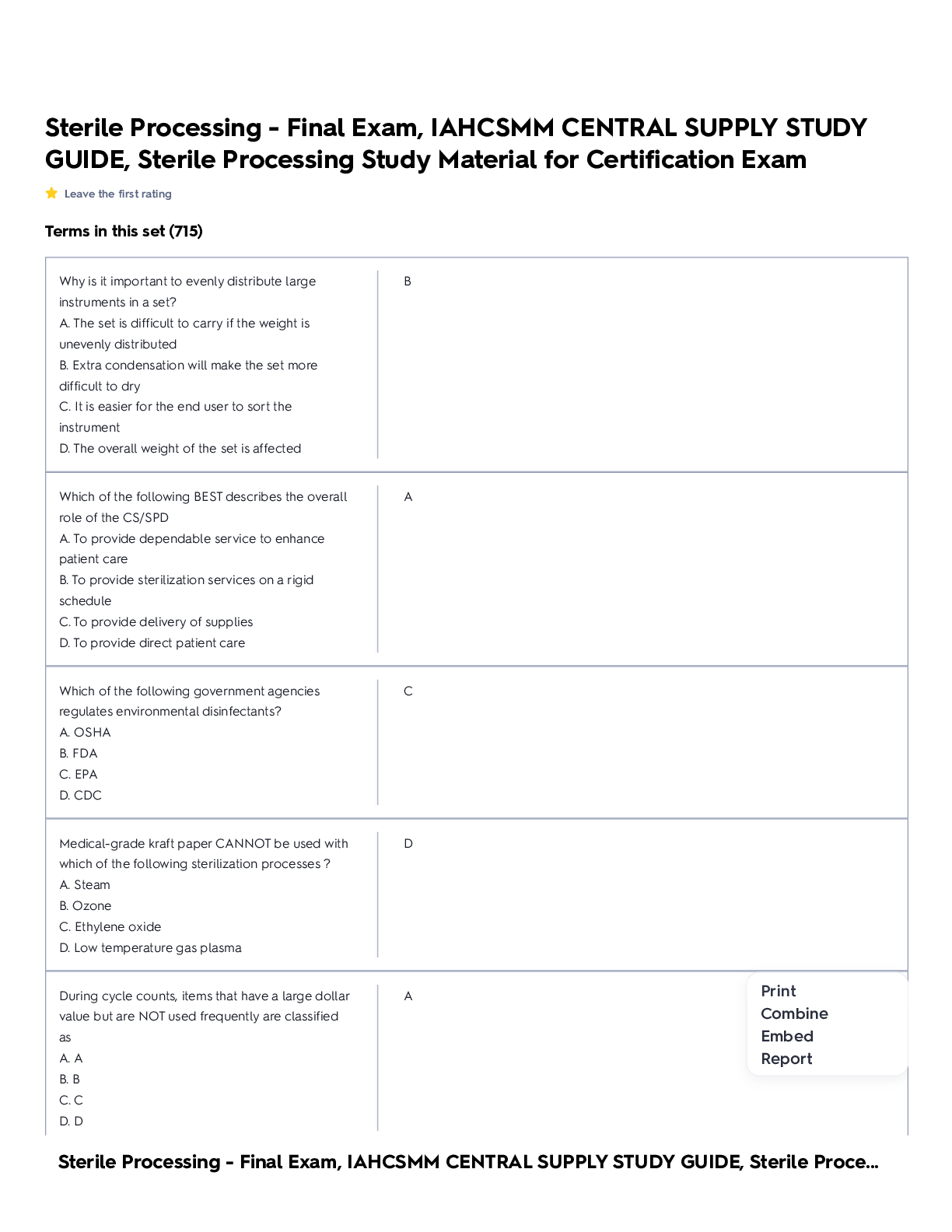

 with Complete Solution.png)
 Career Information with Complete Solution.png)


 for E-6 Career Information_watermark.png)
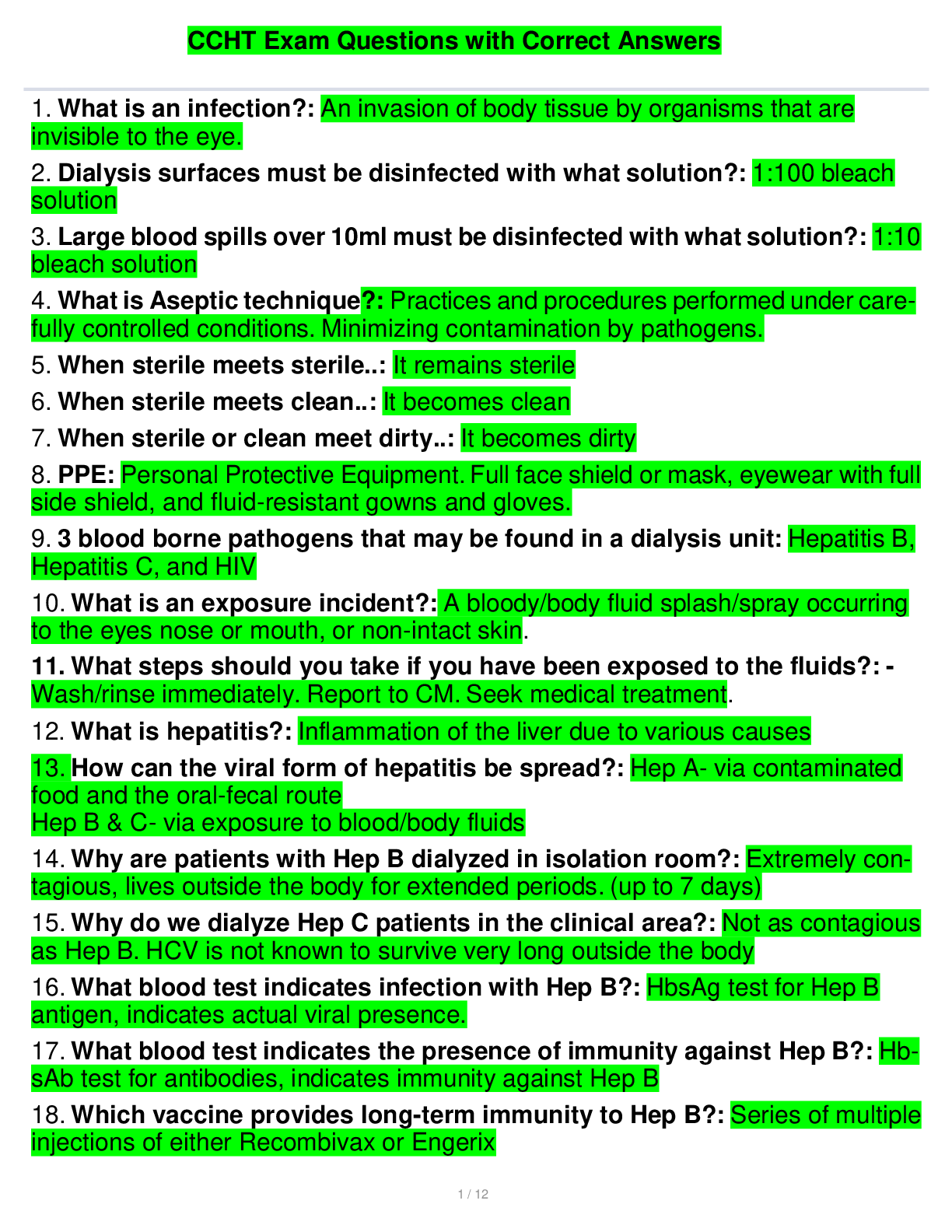
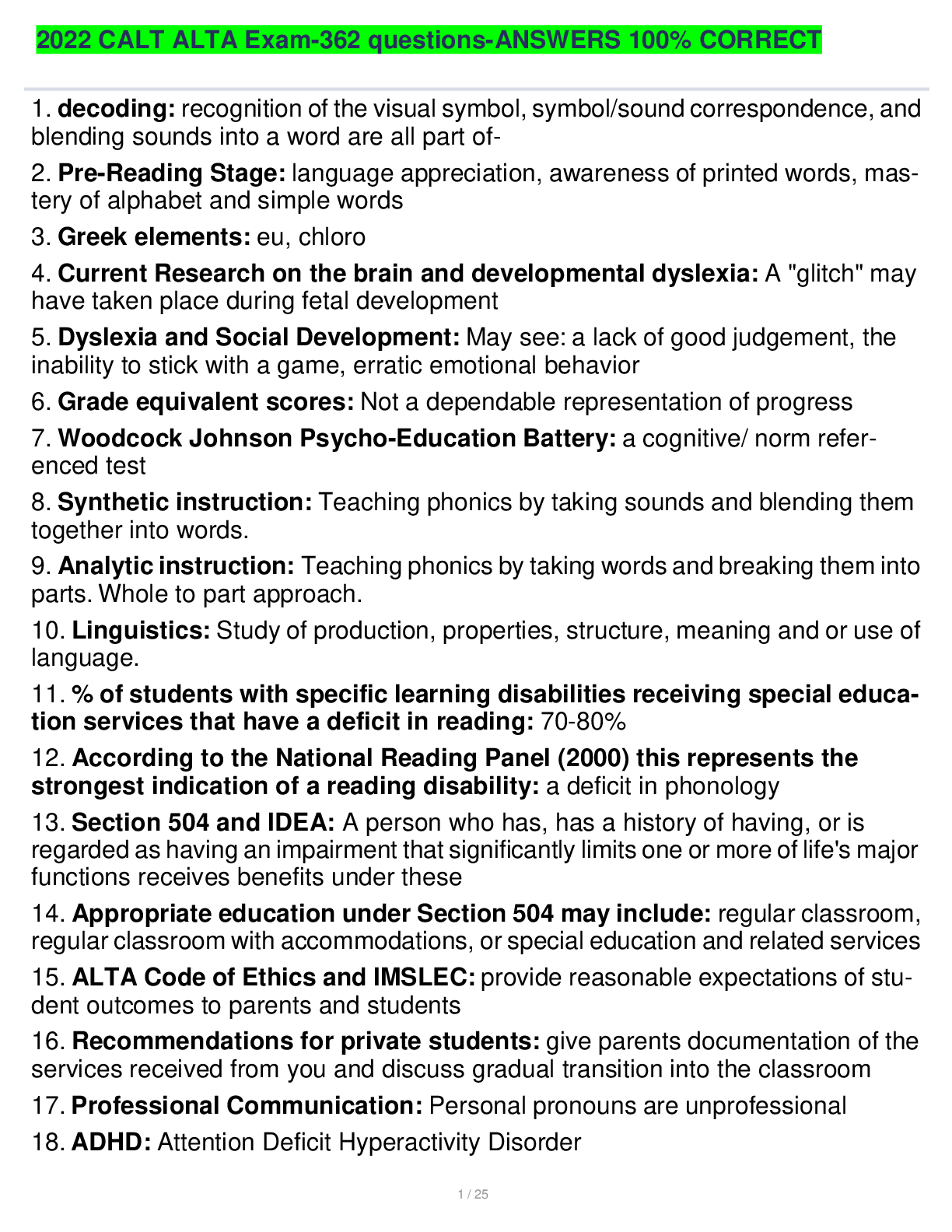



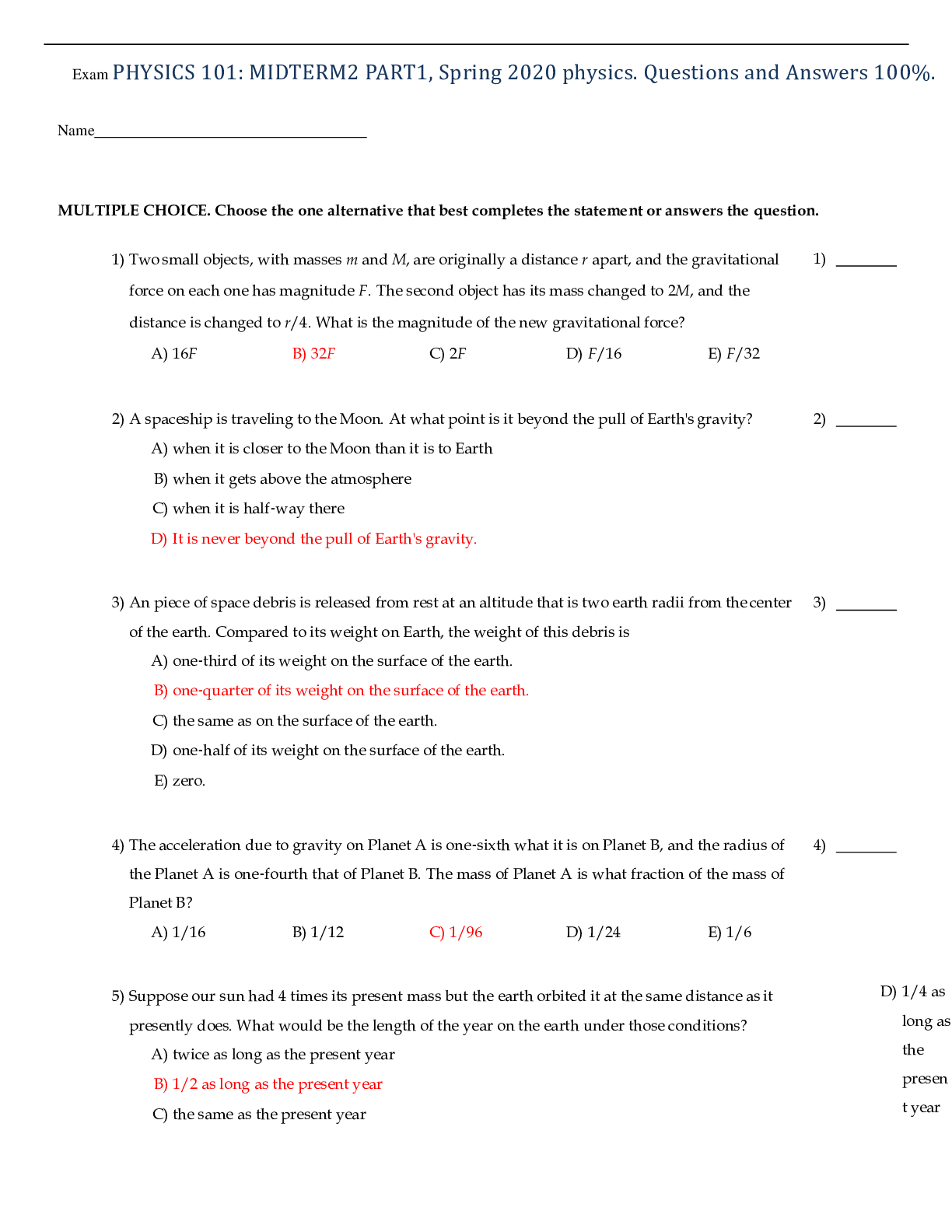
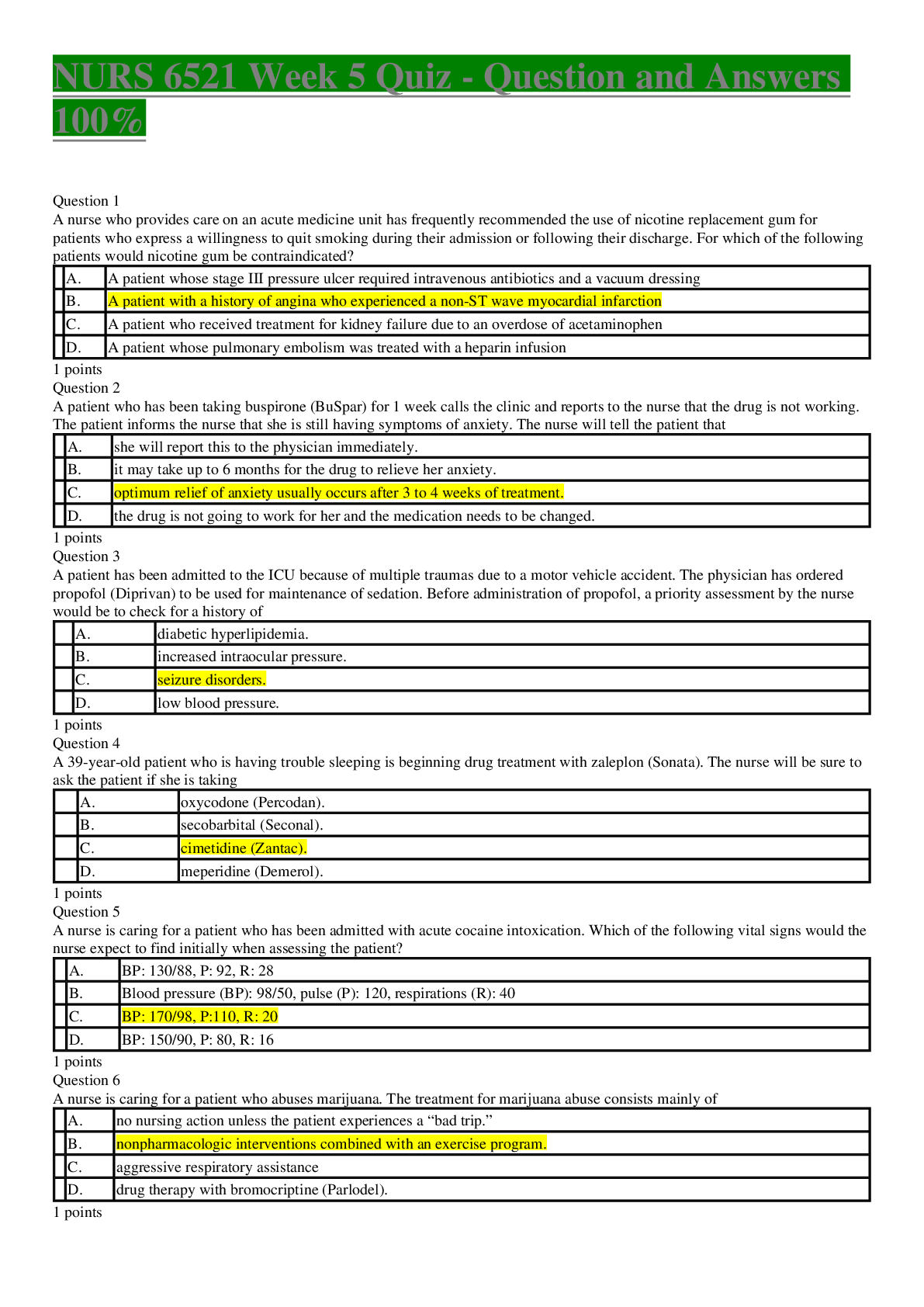
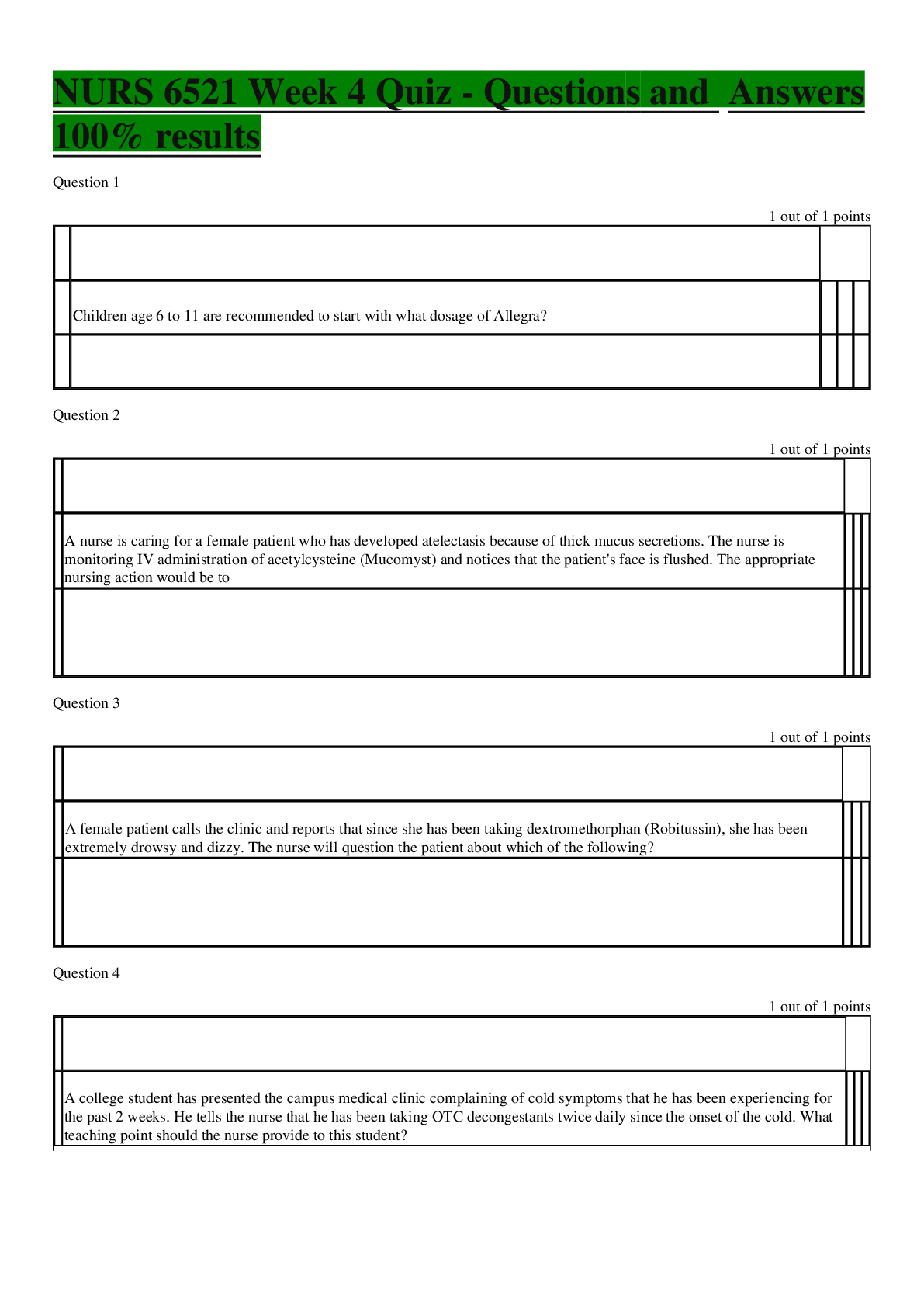
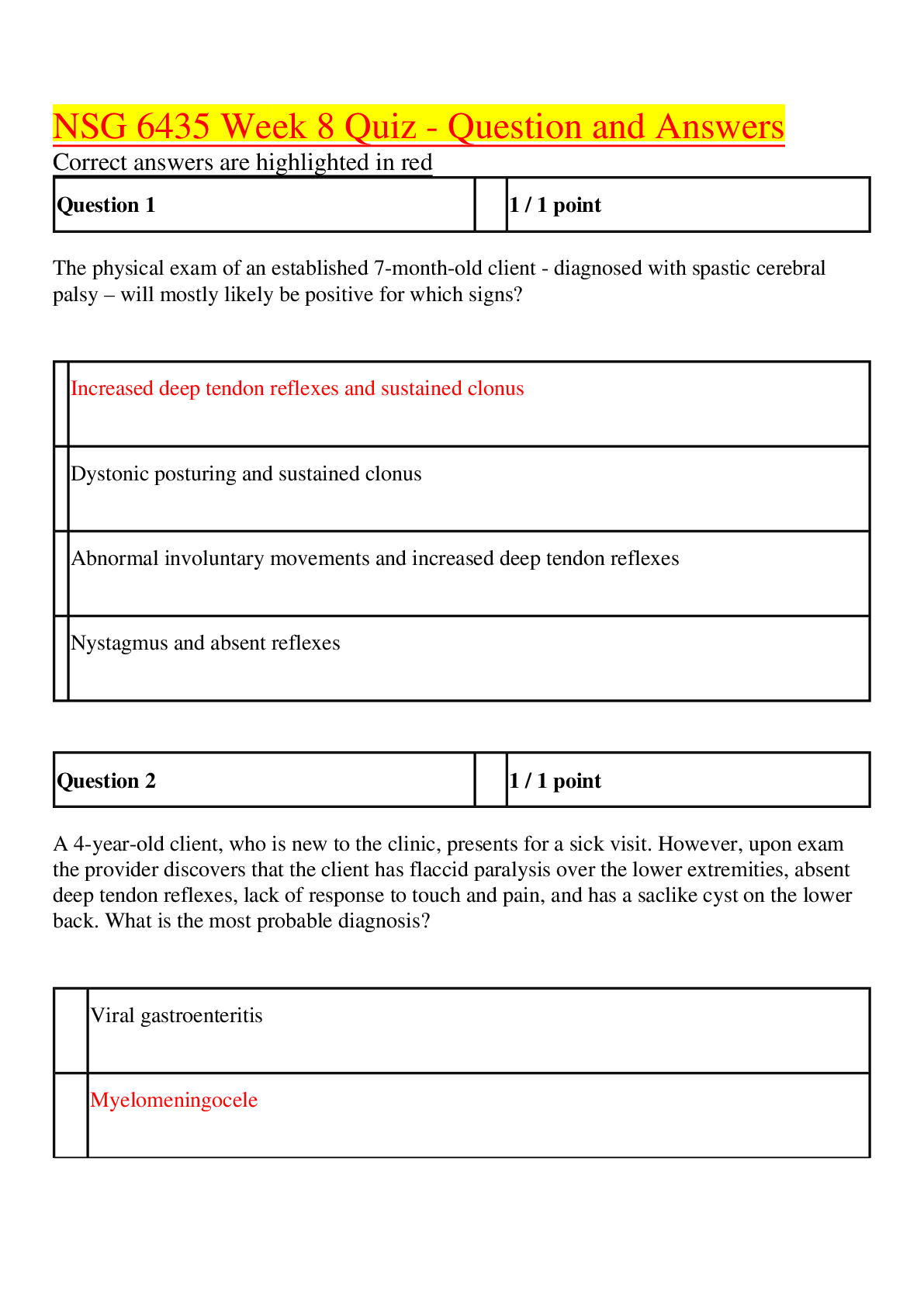
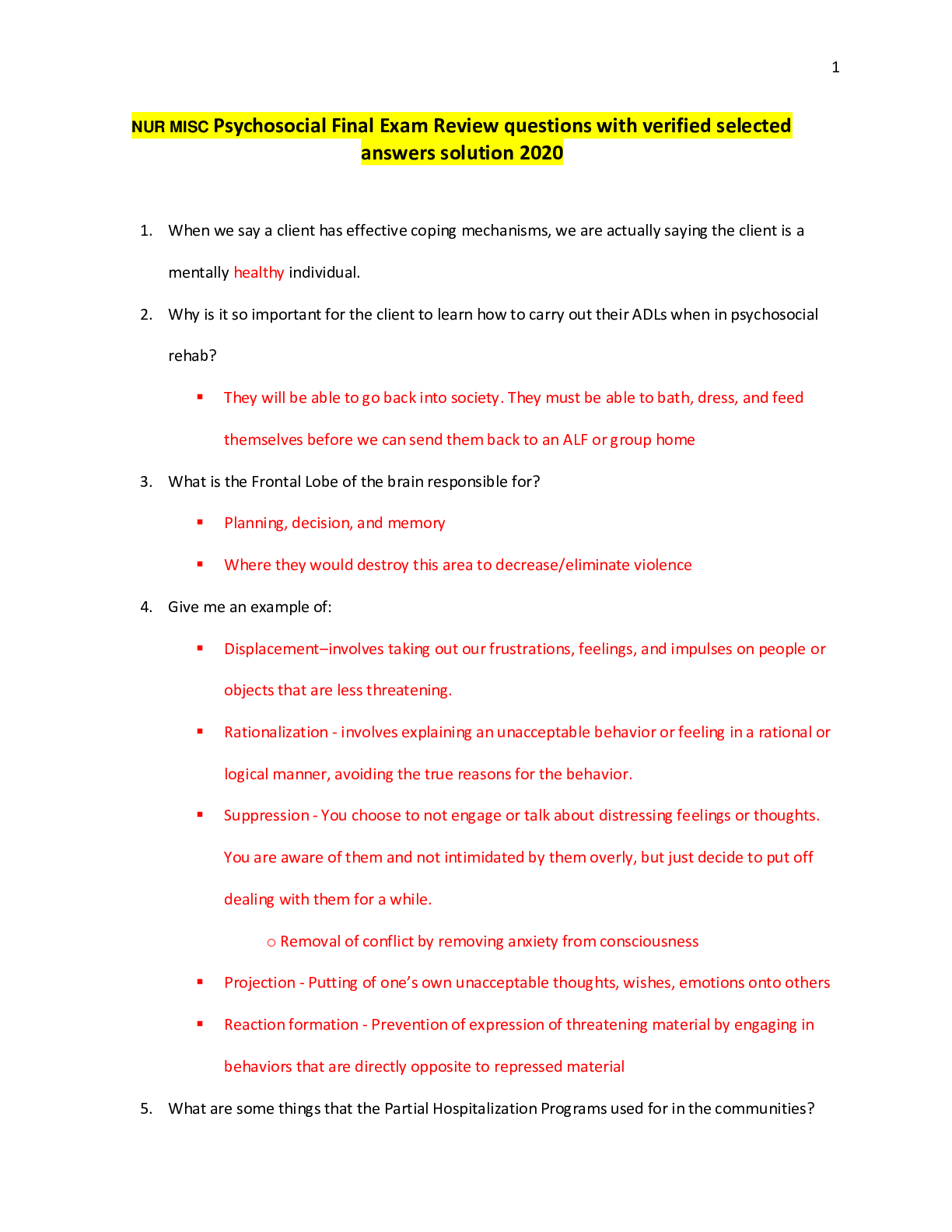
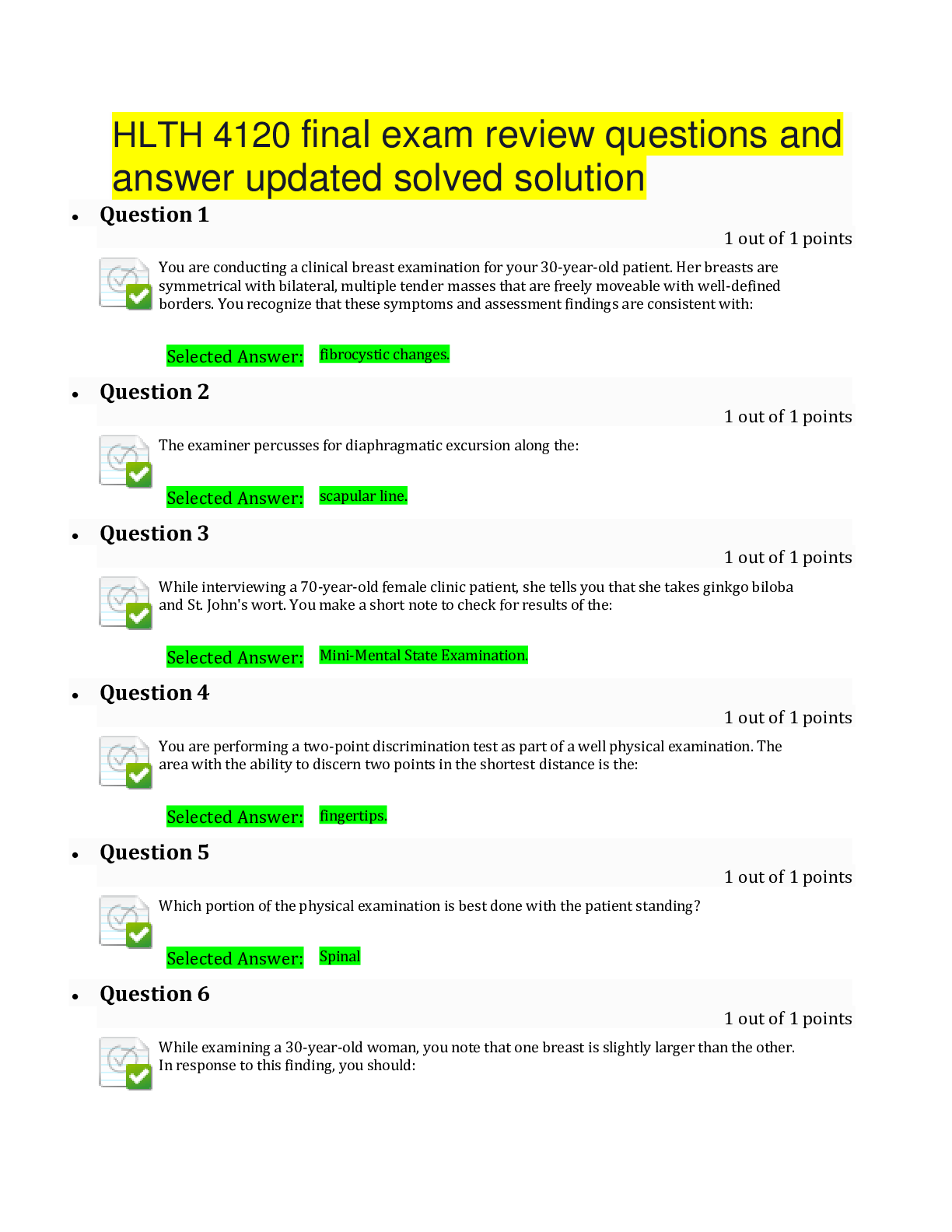
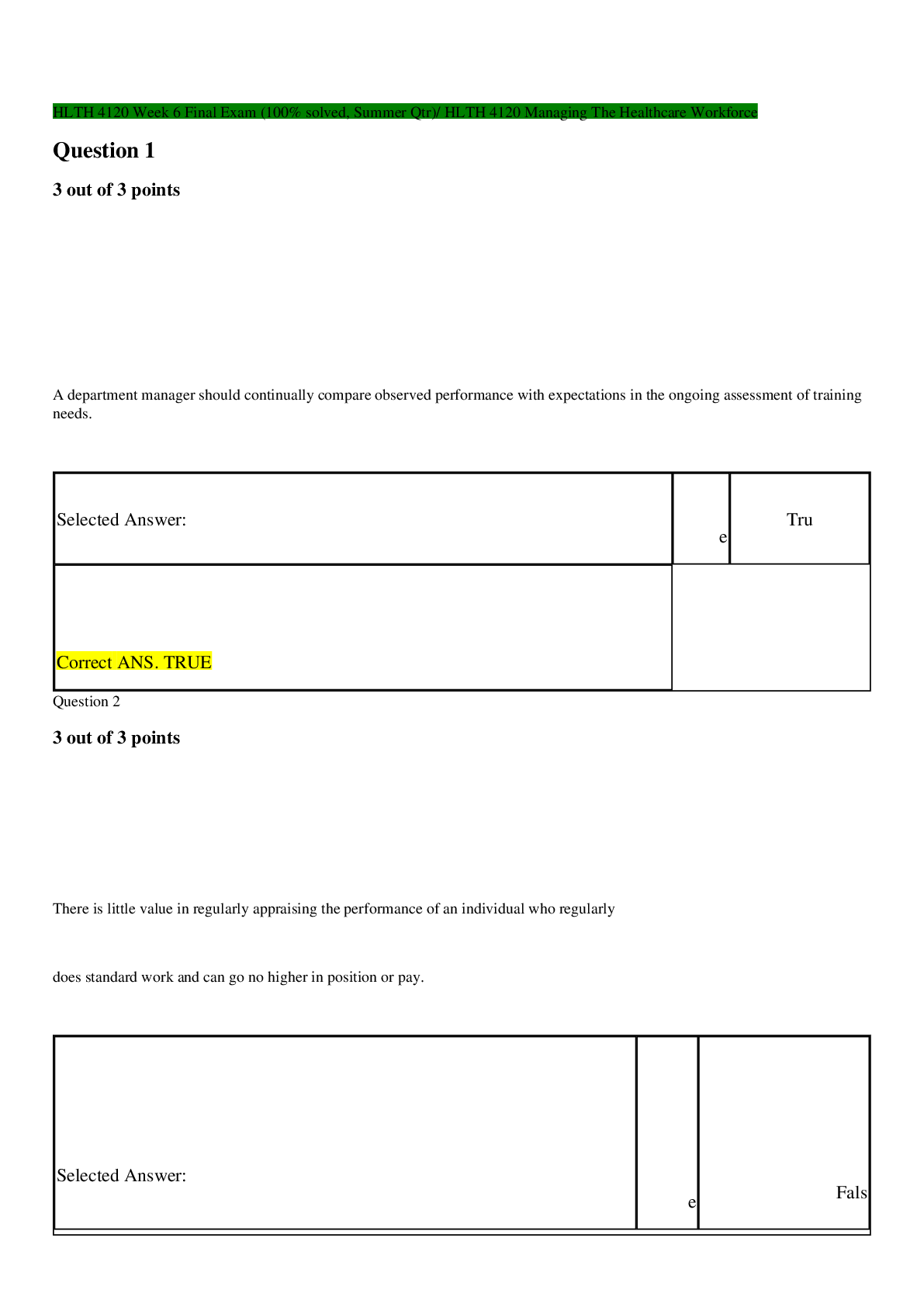



 answers.png)


